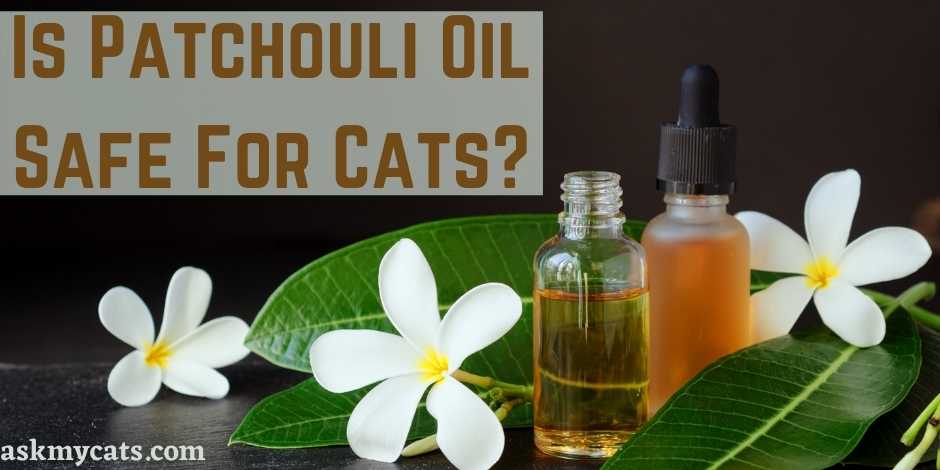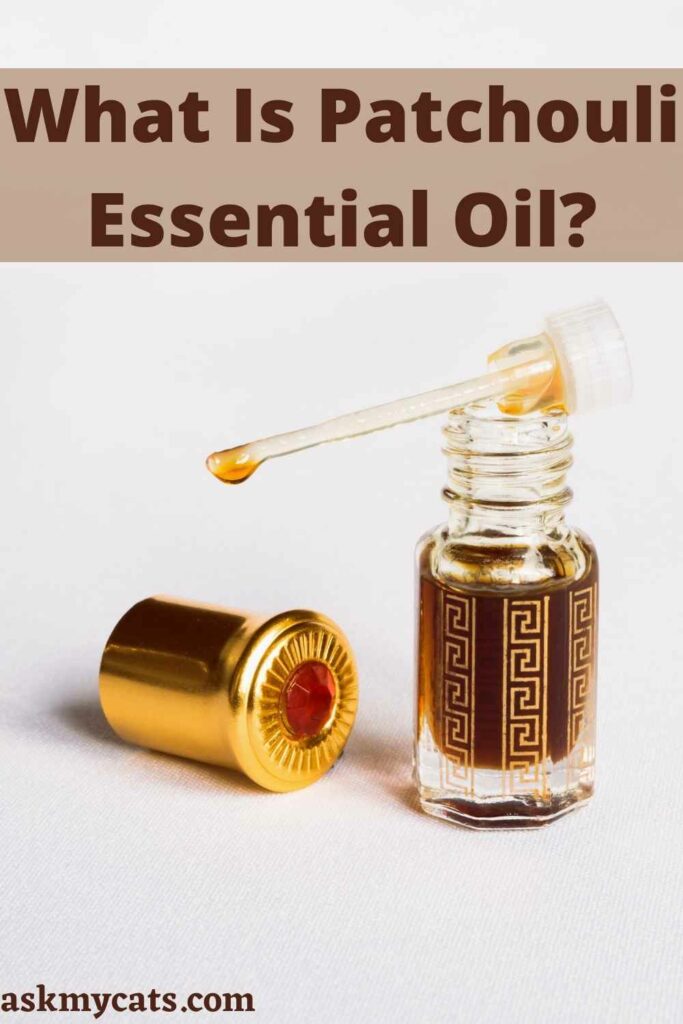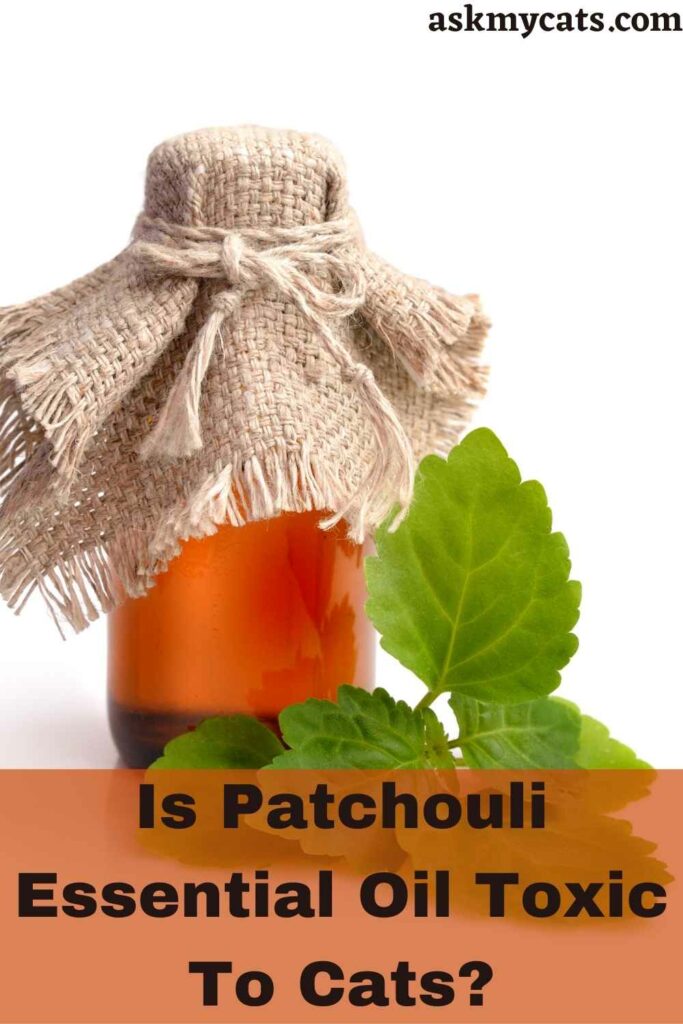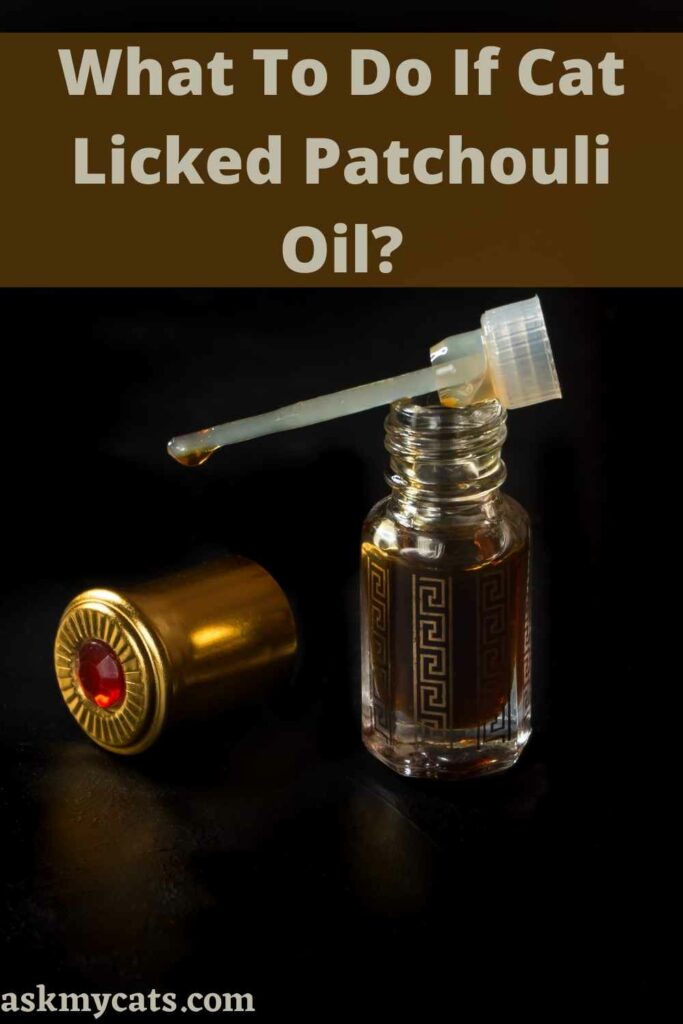For a long time, natural products and essential oils have been popular. While essential oils for aromatherapy, such as lavender or eucalyptus, may help you relax, keep in mind that they can be harmful to pets and other people.
Many essential oils have been found to be toxic to our canine companions. Cats, in particular, metabolize things differently than humans, and many essential oils have been reported to be toxic to our feline companions.
So, is patchouli oil safe for cats?
No, patchouli oil is not safe for cats. Clove oil is toxic when applied to the skin or diffused. Clove oil and pennyroyal oil (both of which are commonly used for natural flea control) have been linked to liver damage, vomiting, diarrhea, seizures, and other problems.
This article will talk about is patchouli oil safe for cats and can you use it around cats.


Give Your Cat the Perfect Day
Get the Free Ebook!
What Are Essential Oils?
Compounds extracted from plants are known as essential oils.
Essential oils are frequently used in aromatherapy, a type of alternative medicine that uses plant extracts to support health and well-being.
Some of the health claims made about these oils, on the other hand, are debatable. Essential oils are plant-based compounds that are extracted. The oils capture the plant’s scent and flavor, or its “essence.”
Because of its unique aromatic compounds, each essential oil has its own distinct aroma. Essential oils are obtained through distillation (using steam and/or water) or mechanical methods such as cold pressing.
After the aromatic chemicals have been extracted, the finished product is made by mixing them with a carrier oil. Chemically extracted essential oils are not considered true essential oils, so the method of extraction is critical.
What Is Patchouli Essential Oil?
Patchouli oil is an essential oil derived from the leaves of the patchouli plant, a type of aromatic herb.

Patchouli oil is made by harvesting and drying the leaves and stems of the patchouli plant. The essential oil is then extracted through a distillation process.
Patchouli oil’s benefits are largely based on anecdotal evidence. This indicates that it is based on firsthand knowledge or testimony.
Many of the uses and benefits of patchouli oil have been investigated by researchers in recent years.
Patchouli Oil is thought to have gotten its name from the Hindi word “pacholi,” which means “to scent,” because of its strong musky scent.
This essential oil is derived from the leaves and flowers of the bushy herb Pogostemon cablin, which is native to tropical Southeast Asia.
Patchouli belongs to the same family as Mint, Lavender, and Sage, which are all well-known aromatic plants.
Patchouli essential oil is typically made by steam distillation, which uses either steam or carbon dioxide. The color of the essential oil darkens into an amber tint as it ages, and the scent becomes richer and smoother.
Is Patchouli Essential Oil Toxic To Cats?
Yes, patchouli essential oil is toxic to cats.

Essential oils are volatile organic plant constituents that contribute to scent and flavor.
Distillation or cold pressing are used to extract plants.
Essential oils are used in insecticides, aromatherapy, personal care products (such as antibacterials), flavorings, herbal remedies, and liquid potpourri, among other things.
Pets, particularly cats, can be poisoned by patchouli essential oils. They are quickly absorbed through the skin and orally before being metabolized in the liver.
Because cats’ livers lack an essential enzyme, they have a hard time metabolizing and eliminating toxins like essential oils.
Essential oils contain phenols and phenolic compounds, which are toxic to cats.
The more essential oil is present, the more dangerous it is for the cat.
Drooling, vomiting, tremors, ataxia (wobbliness), respiratory distress, low heart rate, low body temperature, and liver failure are all symptoms that can occur depending on the amount of exposure.
If any of these symptoms appear, immediately take your cat outside and to a veterinary emergency center if the symptoms do not improve. The veterinarian may notice a low heart rate, low blood pressure, and signs of liver failure.
The higher the essential oil concentration, the greater the risk to your cat. If your cat inadvertently consumes any oils, take him or her to the veterinarian right away.
Patchouli essential oils are absorbed when they come into direct contact with a cat’s skin. Respiratory problems can be caused by inhaling diffused oils in the air.
They can also accumulate on your cat’s fur, causing him to eat them as he cleans and licks. Toxicity can strike unexpectedly or develop over time.
What To Do If Cat Licked Patchouli Oil?
If your cat licked patchouli oil, take her to the vet as soon as possible.

It is critical to obtain a diagnosis and treatment as quickly as possible.
If you suspect your cat has consumed patchouli oil, contact your veterinarian or the Pet Poison Helpline (800-213-6680), a 24-hour animal poison control center.
The sooner you treat your cat, the better his prognosis and outcome will be.
Do not force your cat to vomit, and do not give him activated charcoal.
This could make your cat’s condition worse. Place the product packaging in an airtight container and bring it to the veterinary clinic with you.
If any product gets on your skin or fur, wash it off as soon as possible with a liquid dishwashing detergent.
Patchouli essential oil’s chemicals are quickly absorbed through the skin or orally. Many of these chemicals’ metabolism is controlled by the liver.
Cats are particularly sensitive to essential oils because they lack the liver enzymes needed to effectively metabolize them.
In addition, kittens and young cats, as well as cats with liver disease, are more vulnerable to the negative effects. Patchouli essential oil can irritate or burn the skin and mouth.
Do Cats Like The Smell Of Patchouli Oil?
It is entirely dependent on the cat and its personality whether or not it enjoys the scent of patchouli essential oil.
Patchouli essential oil isn’t on either the list of popular scents that cats despise or the list of popular scents that cats prefer.
Using patchouli essential oil in your home and near your cat can reveal this. Examine your cat to see if he or she is purring and walking around near the diffuser. Your cat likes the scent of patchouli essential oil if you said yes.
Ways To Keep Cats Away From Patchouli Oil
Ways to keep cats away from patchouli oil are: –
Keep your essential oils out of the reach of your cat. Cats are explorers by nature. If your cat ingests, inhales, or comes into contact with concentrated essential oils, poisoning will be more rapid and severe. As a result, keep your jasmine oil out of reach of your cat in a high, out-of-the-way cabinet.
Seal your patchouli oil bottles in a resealable plastic bag and store them in a locked cabinet if they emit a strong scent even when not sprayed. Patchouli oil should be avoided by your cat.
If you’re going to spray patchouli essential oil in the room, keep your cat out of it and don’t let it back in until the scent has faded. Oils should not be used for more than two weeks at a time to avoid low-level buildup.
Wait at least one week before using essential oils again. By opening a window or turning on a fan, you can hasten the dissipation of essential oils.
Frequently Asked Questions
How can I use essential oils safely?
If used incorrectly or in excess, any essential oil can be harmful to cats’ health. It’s still a good idea to use essential oils in dilution or diffusion. Use them sparingly to protect your cat’s environment. Essential oils are probably safer for cats than artificial fragrances and air fresheners. Even so, what appeals to your nose may be too much for your cat. If you’re going to use essential oils around cats, make sure they have a safe place to go that isn’t scented.
Can cats breathe in a patchouli essential oil?
Cats should not be exposed to patchouli essential oil because it can cause a variety of issues, including liver damage. According to research, patchouli essential oil, whether taken internally, applied to the skin or simply inhaled, can be toxic to cats. Severe liver damage, liver failure, respiratory failure, seizures, and even death can result from exposure.
What are the things to keep in mind while using patchouli essential oil around cats?
Patchouli essential oils should not be applied undiluted to any part of a cat’s body. Cats have a habit of licking themselves to groom themselves. Even if you apply patchouli essential oil to the cat’s tail, it will lick the oil off its fur. When applied directly to the skin, patchouli essential oil is far more effective (yours or that of your cat). It is far safer for your cat to diffuse patchouli essential oil in a room rather than applying oils directly to his or her skin. As little as possible, touch your eyes, nose, mouth, and paws. Even if you have diluted patchouli essential oil, avoid those sensitive areas on your domestic cat. After using essential oils on yourself, do not pet your cat. Use caution when applying essential oils to your skin via body care products, lotions, or creams. Because your cat may come into physical contact with you and lick the oil on your skin. Before petting her, you must wash your hands.
Final Words
If you live in a house with curious cats, the risks of using patchouli essential oil outweigh the benefits. Although we do not outright prohibit the use of these oils, we do recommend that you proceed with caution. The essential oil’s form, dosage, and route of administration are all important considerations.
Regardless of which essential oil or diffuser you use, consult your veterinarian, do your research, and proceed with caution.
If you have any questions, please leave them in the comments section.
